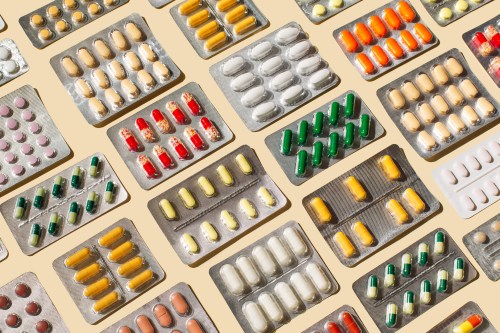The Food and Drug Administration (FDA) has issued a huge recall of 39 different types of generic medications produced by Glenmark Pharmaceuticals, Inc. The impacted medications include drugs designed to treat basic aches and pains to drugs for seizures and high blood pressure, making it important to check the products you have at home.
Experts in This Article
interventional cardiologist and medical director of the Structural Heart Program at MemorialCare Saddleback Medical Center in Laguna Hills, California
director of the Rutgers/RWJBarnabas Medication-Use Safety and Information Center
associate professor of pharmacology and toxicology at Michigan State University.
This recall was initially issued last month, but has now been designated a Class II risk level. What does that mean, exactly? It's “a situation in which use of, or exposure to, a violative product may cause temporary or medically reversible adverse health consequences or where the probability of serious adverse health consequences is remote,” per the FDA.
All of the impacted medications were made at a factory in India and are being recalled because the company “failed to implement adequate contamination control procedures,” according to the FDA’s report.
Which drugs were recalled?
In short, a lot of drugs were recalled. The impacted medications include things like fenofibrate, which is used to lower cholesterol, along with OTC drugs like acetaminophen (the generic version of Tylenol) and ibuprofen (the generic form of Advil).
The FDA has the full information online, along with specifics on lot codes and expiration dates. However, here’s a breakdown to get you started:
- Fenofibrate capsules 67 mg, USP, 100-count bottle
- Propafenone hydrochloride extended-release capsules 225 mg, 60-count bottle
- Propafenone hydrochloride extended-release capsules 325 mg, 60-count bottle
- Solifenacin succinate tablets 10 mg, 30-count bottle and 90-count bottle
- Voriconazole tablets 200 mg, 30-count bottle
- Voriconazole tablets 50 mg, 30-count bottle
- Gabapentin tablets 600 mg, 500-count bottles
- Lacosamide tablets 200 mg, 60-count bottle
- Frovatriptan succinate tablets 2.5 mg, 9-count bottle
- Rufinamide tablets 200 mg, 120-count bottle
- Nitroglycerin sublingual tablets 0.4 mg, 100-count carton
- Pravastatin sodium tablets 80 mg, 90-count bottle
- Fluphenazine hydrochloride tablets, 10 mg, 100-count Bottle
- Fluphenazine hydrochloride tablets 2.5 mg, 100-count bottle
- Metformin hydrochloride extended-release tablets 1000 mg, 90-count bottle
- Indomethacin extended-release capsules, 75 mg, 60-count bottles
- Lacosamide tablets, 100 mg, 60-count bottle
- Nitroglycerin sublingual tablets 0.3 mg, 100-count bottles
- Saxagliptin tablets 5 mg, 30-count bottle and 90-count bottle
- Solifenacin succinate tablets 5 mg, 30-count bottle and 90-count bottle
- Teriflunomide tablets, 14 mg, 30-count bottle
- Ranolazine extended-release tablets 1000 mg, 60-count bottle
- Carvedilol tablets, USP 12.5 mg, 500-count bottle
- Lacosamide tablets, 50 mg, 60-count bottles
- Prochlorperazine maleate tablets, 10 mg, 100-count bottles
- Rosuvastatin tablets 40 mg, 30-count bottle
- Colesvelam hydrochloride tablets 625 mg, 180-count bottle
- Pravastatin sodium tablets, 20 mg, 500-count bottle and 90-count bottle
- Diltiazem hydrochloride extended-release capsules 12HR 120 mg, 100-count bottle
- Lacosamide tablets 150 mg, 60-count bottle
- Clindamycin hydrochloride capsules, USP, 300 mg, 100-count bottles
- Saxagliptin tablets, USP, 2.5 mg, 30-count bottle and 90-count bottle
- Naproxen sodium tablets, USP, 550 mg, 100-count bottles
- Acetaminophen and ibuprofen (NSAID) tablets, 250 mg/125 mg, 144-count packets and 216-count packets
- Cetirizine hydrochloride tablets, USP, 10 mg, 365-count packs
- Pravastatin sodium tablets, USP, 20 mg, 90-count bottle
- Pravastatin sodium tablets, USP, 80 mg, 90-count bottle and 500-count bottle
- Propafenone hydrochloride extended-release capsules USP, 225 mg, 60-count bottles
- Propafenone hydrochloride extended-release capsules, USP 325 mg, 60-count bottles
Why were the medications recalled in the first place?
The FDA’s enforcement report states that there were current good manufacturing process (CGMP) deviations in the medications, which means that proper protocols weren’t followed in the procedures or specifics around the manufacturing process.
“Adherence to the CGMP regulations assures the identity, strength, quality, and purity of drug products by requiring that manufacturers of medications adequately control manufacturing operations,” per the FDA's CGMP policies. “This includes establishing strong quality management systems, obtaining appropriate quality raw materials, establishing robust operating procedures, detecting and investigating product quality deviations, and maintaining reliable testing laboratories.”
If the right protocols are put in place, it helps prevent contamination, deviations, mix-ups, and errors, according to the FDA—and that didn’t happen here.
An inspection report from the processing plant where the medications were produced specifically notes the following concerns:
- Lack of adequate measures in place to prevent cross-contamination between medicines
- Batches of the medicines weren’t properly reviewed for discrepancies
- No documentation of testing methods
- The company didn’t give the quality control unit enough responsibility to approve procedures
Where can you get these medications?
Hopefully, the recalled medications have been pulled from shelves at this point. However, the medications were sold at pharmacies and stores over the counter across the country, according to the FDA. Most medications on the impacted list require a prescription, so you would have needed to receive them at a pharmacy. However, some over-the-counter medications on the list are commonly available at Walmart, Target, and Costco.
So, how worried should you be?
Again, the FDA has listed this as a Class II recall, which is the agency’s second most severe recall classification. At this time, the FDA hasn’t listed next steps on what to do, but experts recommend keeping a few things in mind.
A big one is that there still aren’t a lot of details about the recall. "It's not entirely clear what the issue is,” Cheng-Han Chen, MD, interventional cardiologist and medical director of the Structural Heart Program at MemorialCare Saddleback Medical Center in Laguna Hills, CA. “It’s also not clear if cross-contamination actually happened or if the risk is there.”
“It’s unclear to me what is contaminating these medications,” agrees Jamie Alan, PhD, an associate professor of pharmacology and toxicology at Michigan State University. “It could be many different things. It could be a different medication contaminating another, it could be an inactive binder/filler, it could be something from the machinery.”
Because we just don’t know the full details, Dr. Alan recommends contacting your healthcare provider (if your prescription medication is impacted) to talk about an alternative option. “Your pharmacy may also be able to order equivalent generic drugs from another manufacturer, depending on the medication,” she says. “Many of these have viable alternatives, and your healthcare provider should be able to work through this with you.”
If you're not sure if your medication is impacted, it’s a good idea to call your pharmacy, says Daniel T. Abazia, PharmD, director of the Rutgers/RWJBarnabas Medication-Use Safety and Information Center. “Only your pharmacy staff can confirm if a specific medication is affected, since they know the manufacturer, lot number, and expiration date of the product they dispensed to you,” he says.
It's also important to note that you should *not* stop taking your prescription medication without talking to your healthcare provider first, Dr. Abazia explains. “Unless you have already experienced an adverse drug event with one of the recalled drugs, continue taking the medication as stopping it may cause unintended consequences,” he says. “An example is abruptly stopping a blood pressure medication, which can lead to rebound hypertension—blood pressure that’s higher than before the medication.”
Even if you feel fine on your medication, Dr. Chen says you shouldn’t write this recall off. “Most of these are medications used to treat serious conditions,” he points out. “Cross-contamination can be concerning.” So your best bet is to check in with your pharmacy and/or healthcare provider to learn if any of your medications are posing a risk to your health.
The bottom line
If you have one of the over-the-counter recalled medications at home, stop using it and dispose of the drug. But if a prescription medication you’re taking has been recalled, call your prescribing healthcare provider. They can help you understand whether your medication is affected and offer next steps.
Sign Up for Our Daily Newsletter
Get all the latest in wellness, trends, food, fitness, beauty, and more delivered right to your inbox.
Got it, you've been added to our email list.









